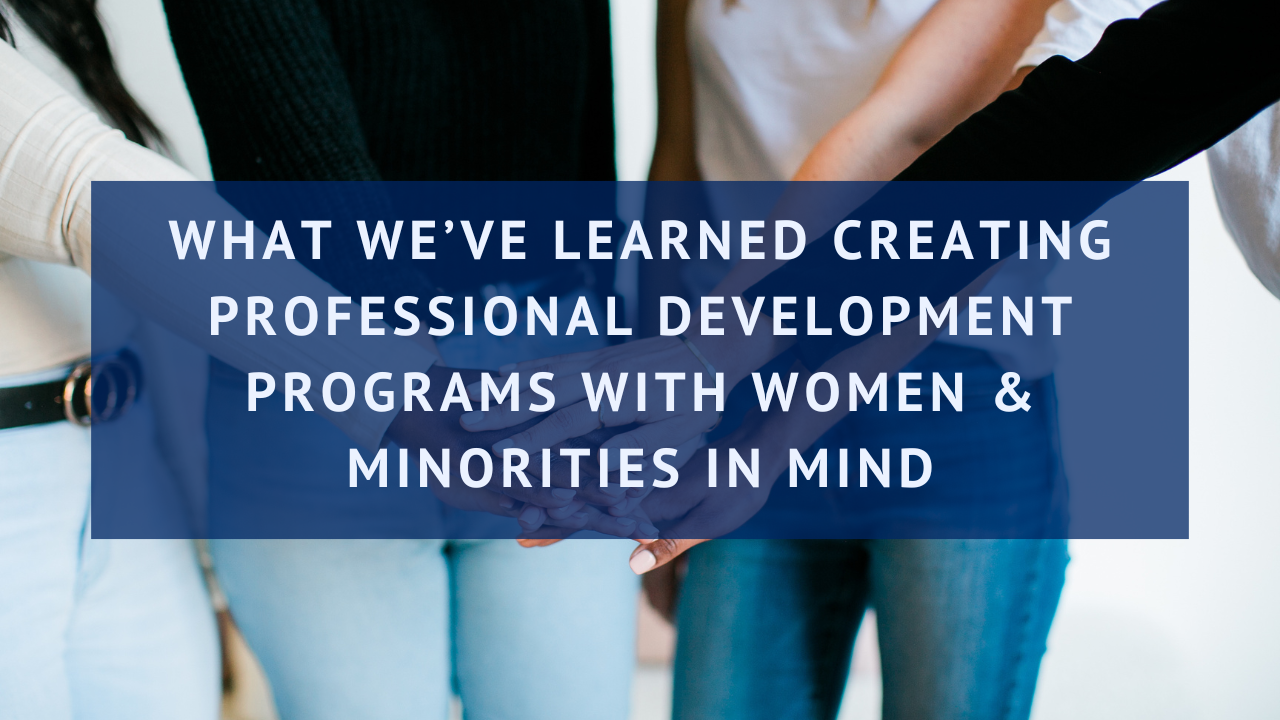What We've Learned Creating Professional Development Programs with Women and Minorities in Mind
Feb 06, 2023
At Advocation, we operate with a values-first mindset, meaning everything we do must align with our values. Two of our company values are impact and progress.
Impact. If something we are doing is not making an impact, it’s not worth our time. Our professional development programs focus on elevating rising leaders within agencies. We focus on the intersection of hard skills, soft skills, and leadership skills to create the biggest impact on each agency, professional, and clients they serve.
Progress. We aim to move the needle forward not just for the clients we serve, but for the business community as a whole. A core opportunity for progress in all industries is creating a professional development curriculum that accounts for the variety of lived experiences that make up a truly diverse team. Most professional development resources are created by white, cis-presenting individuals. Even with the best intentions to teach and elevate those who consume the content, very few professional development programs take into account a variety of essential considerations such as varying cultural norms, the needs of neurodivergent individuals, or varied accessibility to resources.
We're by no means diversity, equality, and inclusion experts, but it is a priority within our company. It shows up in every corner of our business, and we're constantly iterating, improving, and learning. We're sharing a few important blindspots we’ve uncovered and improved upon when creating our training and development programs. This is by no means a comprehensive list of best practices, but rather a few takeaways that our team has learned.
Recognizing different lived experiences is a foundational part of professional development
When we come across or even share "best practices," it's uncommon to question where they came from and whether or not they are truly best practices for everyone. Professionals who identify as women, BIPOC, LGBTQ+, those living with a disability, neurodivergent, and immigrants for example, are all individuals who walk through the professional world in a very different way than white, cis men. One experience is not more important than the other, but to think that the lived experience of one group fully represents the experiences of the whole is simply inaccurate.
When it comes to professional development, context is an important foundational part of learning retention. In order to create a curriculum with staying power, it's critical to recognize that each person comes into the room with a different context based on their life experiences. Presenting learning materials that speak to a much wider breadth of context is crucial to ensure that everyone is set up to succeed.
How privilege plays out in skill development
There are certain skills that are critical to a successful career in an agency, and some of those skills are fostered in childhood through activities that might not be accessible to everyone. For example, leadership, project management, and teamwork skills are often fostered early on through things like Girl Scouts, Boy Scouts, group sports, debate, theater, and other activities that are often more accessible to privileged groups and those within certain family income brackets.
When an individual doesn't seem to be a "natural leader," it might not mean they don’t have the potential to thrive in a new role or a new job, but rather, they may need the right mentorship and an opportunity to hone a particular skill set. By recognizing this, we are hopefully not writing off or ignoring individuals who don't appear to be a "natural talent”, but instead, offer opportunities for each individual to build and improve skill sets that are unique to their abilities. This is the future of professional development and career pathing, and what equity looks like in a professional development program.
Embracing the variety of ways that people think
Creative thinking is one of the biggest commodities within agencies. A core way to foster this is to not just encourage creative thought, but actually create learning and working environments that embrace neurodiversity. Neurodiversity is the idea that there is no right way to think, and people respond to the world around them in a variety of ways. The term is often used when referring to individuals on the autism spectrum or those who live with learning disabilities. According to a variety of studies, 15-20% of the U.S. population is neurodiverse.
As leaders, we can embrace neurodiversity in professional development programs in a variety of ways.
- Train managers on how to adapt their leadership and management style to be more flexible in supporting a variety of team members' needs.
- Prioritize psychological safety in both professional development and in the workplace as a whole, so that employees feel confident to communicate the areas they feel innately strong and where they feel they are being challenged. This gives leaders the opportunity to offer support in certain areas and recognition for superior performance in others.
- Create structure and clarity around each individual’s role and job description. This is critically important for professional development so that each professional knows what is expected of them, their responsibilities, and which goals and promotions they are working towards.
- Mitigate chaos. The majority of neurodivergent individuals do not thrive in chaos, and agencies can easily become chaotic! Create structure and clarity within the organization when possible. This can materialize in role clarity for each employee, crystal clear expectations on project KPIs, and structure on meeting agendas and timelines.
We’re committed to pushing the boundaries when it comes to the future of work and making an impact for agency leaders, teams, and professionals in all creative industries. There will be many more of these conversations around inclusion as we continue to question our standard practices and processes in this evolving world.
If you’d like to learn more from the Advocation team on best practices for PR & marketing agency teams, follow us on social media–Instagram, LinkedIn and YouTube.


